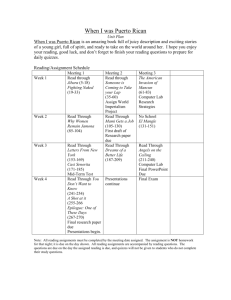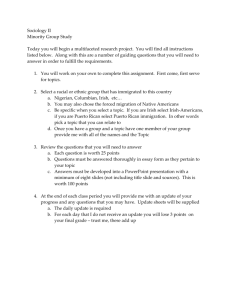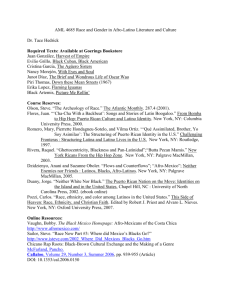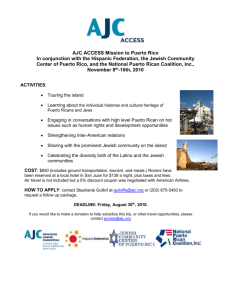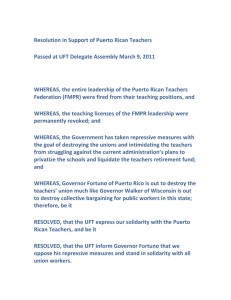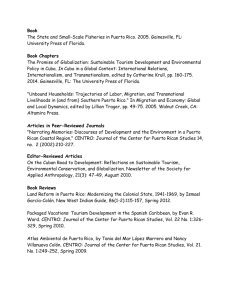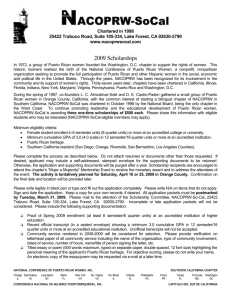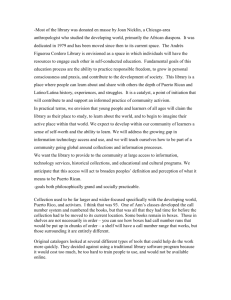Fall 2008 82521 TCL 464 Latina/o Literature
advertisement
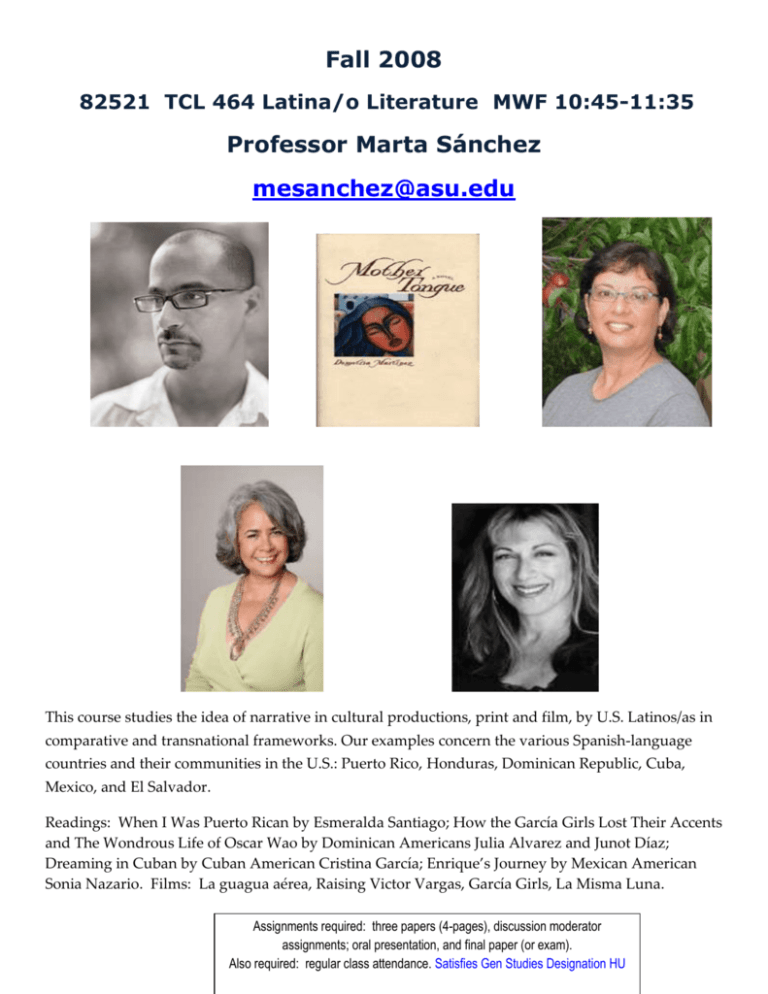
Fall 2008 82521 TCL 464 Latina/o Literature MWF 10:45-11:35 Professor Marta Sánchez mesanchez@asu.edu This course studies the idea of narrative in cultural productions, print and film, by U.S. Latinos/as in comparative and transnational frameworks. Our examples concern the various Spanish-language countries and their communities in the U.S.: Puerto Rico, Honduras, Dominican Republic, Cuba, Mexico, and El Salvador. Readings: When I Was Puerto Rican by Esmeralda Santiago; How the García Girls Lost Their Accents and The Wondrous Life of Oscar Wao by Dominican Americans Julia Alvarez and Junot Díaz; Dreaming in Cuban by Cuban American Cristina García; Enrique’s Journey by Mexican American Sonia Nazario. Films: La guagua aérea, Raising Victor Vargas, García Girls, La Misma Luna. Assignments required: three papers (4-pages), discussion moderator assignments; oral presentation, and final paper (or exam). Also required: regular class attendance. Satisfies Gen Studies Designation HU Page |2 LITERARY TEXTS (AVAILABLE AT ASU BOOKSTORE) WHEN I WAS PUERTO RICAN ($11.25, used) HOW THE GARCIA GIRLS LOST THEIR ACCENTS ($12 used) DREAMING IN CUBAN ($10.50 used) ENRIQUE’S JOURNEY ($15 new, $11.25 used) WONDROUS LIFE OF OSCAR WAO ($14 paperback coming in September) FILMS (Students must view on their own) RAISING VICTOR VARGAS GARCÍA GIRLS LA MISA LUNA CUBAN DOCUMENTARY COURSE BACKGROUND This course examines the idea of narrative in Latino/a cultural productions. Our focus is literary writings and film. The descriptor “Latino/a” refers to the populations who in the distant and recent past have migrated to live in the United States from Spanish-speaking countries of the Américas. One element common to literary writings and film is narrative or story telling. How does a writer tell a story? How does a filmmaker tell a story? What kind of stories do the particular writers and filmmakers studied in this course tell? What constraints determine the content and style? Represented are authors and filmmakers from Puerto Rican-, Dominican-, Cuban-, and Mexican-American cultural groups. COURSE TOPIC AND OBJECTIVES *to read literary writings and view films and analyze their story-telling approaches and content. *to identify, analyze , and think critically, orally and in writing, about the issues with which these writings and films repeatedly engage. Some examples of issues will come from areas of language, assimilation and transculturation, trans-generational conflict, social class mobility and others. COURSE REQUIREMENTS AND GRADING: Students will be evaluated as follows: 1 Attendance, engagement with class texts, oral participation in class. Students must come to class on time. Students are to arrive promptly at 12:15. No credit for class if student is more than 10 minutes late or leaves before instructor ends class. Students are responsible for coming to class with comments and questions on texts, films and assigned articles. Students are expected to engage actively in class discussion and to show respect for diverse viewpoints. 15% 2 Approximately, 10 blackboard discussion postings, depending on enrollment. Each student will take a turn as “moderator” of blackboard discussions. Blackboard discussions are organized around student responses to a question posted. Beginning the fifth week or so, the student will make up a question and send it to me; I will post it by no later than Saturday 5p. Students will have until Page |3 Wed 5p to respond. The moderator will collect, summarize, and comment on the responses and prepare himself/herself to moderate a discussion on Friday. Blackboard discussion are interactive: in addition to thoughtfully answering the question, each student must respond to at least one other student’s answer. The instructor will be responsible for leading the discussion the first Fridays. The first question will be posted by Saturday Aug XX , no later than 5pm, and the deadline to post is Wed Aug XX at 5p. 20% 3 One position paper, due week 7; with an argument developed by means of specific examples and interpretive commentary; it should present an intelligent and focused reading of class texts (print and film). Instructor will identify texts. 5-6 pages 20% 4 Each student will be responsible for one oral presentation: 10 minutes. This presentation, due during the last semester weeks, may be related to the research paper (see 5 below), and it should reveal evidence of student’s awareness of his/her critical perspective. All students are expected to attend class during these weeks to support their peers. Attendance will be worth double these weeks. 20% 5) Final research paper: 8 pages for undergrads; 10 pages for MA; a comparative study showing good grasp of the storytelling concept and act in one written and one filmic text, within the context of Latino history and culture. Some secondary sources are required. 25% Students are expected to write grammatically correct English, following standard rules of punctuation and word usage, and the MLA style for citation of sources. SCHEDULE OF CLASSES, READINGS, ASSIGNMENTS WEEK 1 INTRODUCTION OF THEMES, TEXTS, TOPICS 8.25 Review Syllabus, Readings, Assignments 8.27 “Thesis on Latino Bloc” – Essay #1 8.29 “Latino Bloc” WEEK 2 9.1 PUERTO RICAN HISTORICAL CONTEXT Holiday 9.3 When I was Puerto Rican - Esmeralda Santiago “How to Eat a Guava”. . . pp 3-60 9.5 When I was Puerto Rican “The American Invasion of Macún”. . .pp 61-130 (Posted on Blackboard) Page |4 SCHEDULE OF CLASSES, READINGS, ASSIGNMENTS (cont’d) WEEK 3 9.8 When I was Puerto Rican - “El Mangle”. . . pp 131-85 9.10 When I was Puerto Rican - “Dreams of a Better Life” . . .pp 188-end 9.12 ESSAY #2 WEEK 4 9.15 La guagua aérea - clips shown in class 9.17 La guagua aérea - clips shown in class 9.19 RECAP When I Was Puerto Rican and La guagua aérea WEEK 5 9.22 DOMINICAN - HISTORICAL CONTEXT How the García Girls Lost Their Accents - Julia Alvarez 9.24 García Girls 9.26 García Girls WEEK 6 9.29 Film - García Girls clips shown in class 10.1 García Girls 10.3 RECAP: García Girls – literary text and film WEEK 7 10.6 CUBAN HISTORICAL CONTEXT Dreaming in Cuban – “Ordinary Seductions”. . . pp 3-101 10.8 Dreaming in Cuban – “Imagining Winter”. . .pp 105-203 10.10 (Posted on Blackboard) clips shown in class Dreaming in Cuban – “The Languages Lost”. . . pp 213-44 WEEK 8 10.13 Film – Cuban documentary clips shown in class 10.15 Documentary film clips shown in class 10.17 RECAP: Dreaming and documentary film Page |5 SCHEDULE OF CLASSES, READINGS, ASSIGNMENTS (cont’d) WEEK 9 10.20 MEXICAN AMERICAN – HONDURAS AND MEXICO Enrique’s Journey - Sonia Nazario The Boy Left Behind, Seeking Mercy. . .pp 3-60 10.22 Enrique’s Journey – Facing the Beast, Gifts and Faith. . .pp 61-135 10.24 Enrique’s Journey – On the Border, A Dark River, The Girl Left Behind . . .pp 137-240 WEEK 10 0.27 Film: La misma luna clips shown in class 10.29 La misma luna clips shown in class 10.31 RECAP: Enrique’s Journey and Luna WEEK 11 11.3 DOMINICAN Brief and Wondrous World of Oscar Wao – Junot Díaz 11.5 Oscar Wao 11.7 Oscar Wao WEEK 12 11.10 FILM - Raising Victor Vargas clips shown in class 11.12 Raising Victor Vargas (cont’d) clips shown in class 11.13 RECAP: When I was Puerto Rican and Raising Victor Vargas WEEK 13 11.17 Workshop –Student Presentations 11.19 Student Presentations (cont’d) 11.21 Student Presentations (cont’d) WEEK 14 11.24 Student Presentations (cont’d) 11.26 Student Presentations (cont’d) 11.27–28 Thanksgiving Break Page |6 WEEK 15 12.1 Workshop – Prepare Student Final Papers 12.3 Open 12.5 Open WEEK 16 12.8 Final Class 12.10 Reading Day Final Paper It is very important that you read and understand the following: ACADEMIC DISHONESTY! In the “Student Academic Integrity Policy” manual, ASU defines “’Plagiarism” [as] using another's words, ideas, materials or work without properly acknowledging and documenting the source. Students are responsible for knowing the rules governing the use of another's work or materials and for acknowledging and documenting the source appropriately.” You can find this definition at: http://www.asu.edu/studentaffairs/studentlife/judicial/academic_integrity.htm#definitions Academic dishonesty, including inappropriate collaboration, will not be tolerated. There are severe sanctions for cheating, plagiarizing and any other form of dishonesty. DISCLAIMER: PLEASE BE ADVISED THAT THE CLASS READINGS MAY CONTAIN MATERIAL THAT CHALLENGE YOUR RELIGIOUS, SEXUAL, RACIAL, AND POLITICAL MORES.
